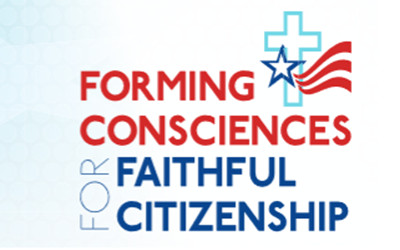In a few short weeks, citizens of the United States will have the opportunity to go to the polls once again to select a new president and Congress, and to make their choices concerning the political course that our country should take over the next four years. Conventions and debates are over and the political parties have outlined their own particular visions for the future. Catholics in America are faced with some very difficult decisions.
 This is a time for people of faith to stand up and press for accountability. Both of the major parties, Republican and Democrat, claim to be close to the Catholic Church's teaching on a number of issues - and in certain instances they are. But neither party totally reflects the consistent ethic that Catholic Social Teaching has upheld and continues to call for.
This is a time for people of faith to stand up and press for accountability. Both of the major parties, Republican and Democrat, claim to be close to the Catholic Church's teaching on a number of issues - and in certain instances they are. But neither party totally reflects the consistent ethic that Catholic Social Teaching has upheld and continues to call for.
Latest statistics show that an estimated 112 million American adults (44%) are struggling to pay for healthcare, and more than double that number feel that what they do pay is not worth the cost. The United States is considered the richest country in the world, and yet 37.9 million (11.5%) of its residents live in poverty. Each day, 25,000 people, including more than 10,000 children, die from hunger and related causes. Some 854 million people worldwide are estimated to be undernourished, and high food prices may drive another 100 million into poverty and hunger. We are faced with many issues that impact our daily lives. Many people resort to misinformation and violence to solve our most difficult challenges - abortion to deal with problem pregnancies, the death penalty to combat crimes, euthanasia and physician-assisted suicide to deal with the burdens of age, illness and disability, and war to address international disputes.
Given all of that, Americans must weigh carefully how participation in the public policy debate and our vote can contribute to greater respect for human life and dignity, religious tolerance and democracy, economic justice, and care for God's creation.
If there is such a thing as a "Catholic Platform" it has been eloquently stated in the American Bishops Statement, Forming Consciences For Faithful Citizenship. In this document, the bishops outline several important areas that are at the heart of Catholic Social Teaching:
- The Life and Dignity of the Human Person - How will we protect the weakest in our midst-innocent, unborn children? How can we raise our children with respect for life, sound moral values, a sense of hope, and an ethic of stewardship and responsibility?
- The Common Good How will we address the consequences of hunger, debt, and lack of development around the world? How will we provide for the growing number of families and individuals without affordable and accessible health care? How can health care protect and enhance human life and dignity?
- Solidarity: How do we combat continuing prejudice, bias, and discrimination and heal the wounds of racism, religious bigotry, and other forms of discrimination?
- Subsidiarity: How do we reflect the essential freedom and innate human dignity of each person while also recognizing the role higher authorities, such as government, can play to ensure that all people are able to thrive.
Every candidate, policy, and political platform should be held accountable and measured by how they touch the human person, whether they enhance or diminish human life, dignity, and human rights and how they advance the common good. It is our particular vocation and responsibility to transform the world. And we are called to form our consciences so that we can examine the positions of candidates and make choices based on Catholic moral and social teaching.
There is much that can be done by Catholics right now - even before the elections - to express our concerns to all candidates running for office. We need to challenge them to enact just policies. We need to remind them of our belief that government should focus on the common good, the protection of our planet Earth and all of its wonderful resources, and to address the growing disparity between rich and poor. We need to do this because our lives are rooted in the Gospel values of Christ and the social justice teachings of our Church.
Today's Gospel shows Jesus giving sight to the blind Bartimeus over the objections of those around him. We believe that our God is a God of Justice and Compassion for all of his creation. Our mandate is to ‘go into all the world and proclaim the good news to the whole creation.’ Creation’ refers to every aspect of human life and nothing human can be alien to it.





